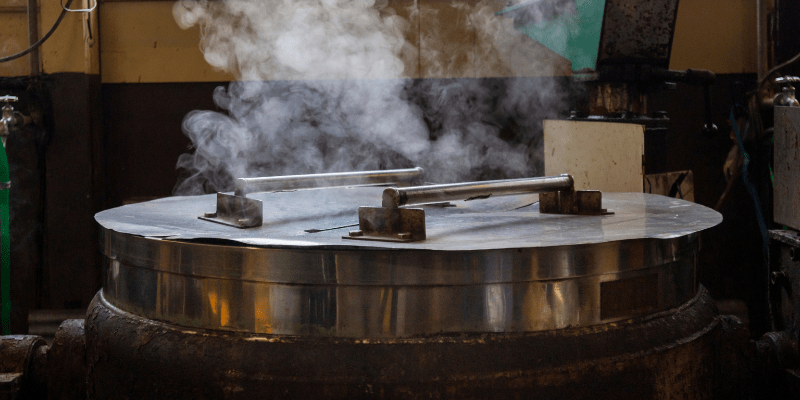Reporting boilers and pressure vessels: What Ontario’s agricultural sector needs to know

Owners and operators of boilers and pressure vessels (BPVs) used for agricultural purposes are required to report their pressure equipment to the Technical Standards and Safety Authority (TSSA).
The lifting of the exemption on agricultural BPVs on July 1, 2021, means that installations of BPVs, fittings, and piping used for agricultural purposes must comply with Ontario Regulation 220/01: Boilers and Pressure Vessels under the Technical Standards and Safety Act, 2000, and the Canadian Standards Association (CSA) B51 Boiler, Pressure Vessel and Pressure Piping Code.
As agricultural BPVs are newly regulated, TSSA is working with agricultural associations across Ontario to ensure that operators and owners are fully informed that installations of BPVs, fittings, and piping used for agricultural purposes are regulated by safety laws. TSSA inspectors will educate owners by conducting a site assessment for those who report BPVs.
Owners and operators of agricultural BPVs that are regulated by safety laws must comply with key requirements. These include:
- Ensuring that pressure equipment has a Canadian Registration Number (CRN) marked on the nameplate of every BPV.
- Obtaining a Certificate of Inspection (COI) for their pressure equipment that will require periodic inspections to ensure continued safe operation.
- Ensuring that the company they engage to repair or alter BPVs holds a Certificate of Authorization from TSSA.
Since some equipment is exempt from inspection that is required by the regulation, due to factors like size, pressure, operating temperatures, or its use of non-hazardous liquids, TSSA uses the information submitted in the reporting form to conduct a risk assessment, which will be used to establish a priority list for scheduling site assessments. For a full list of pressure equipment excluded from the regulation, see Ontario Regulation 220/01 and Amendments to the 2001 Boilers and Pressure Vessels Code Adoption Document.
Tony Gabriele, BPV Project Lead and Regional Supervisor with TSSA, emphasizes that the safety of Ontarians will continue to be the driving force. “Site assessments ensure that owners and operators of agricultural sites that use regulated BPVs understand and comply with the provincial regulations,” he explained.
TSSA will notify agricultural sites that have been selected for a site assessment. Agricultural operators can prepare for the site assessment by reviewing the checklist of what an inspector will look for. Agricultural sites need to ensure their equipment is accessible and ready for site assessment.
Agricultural sites should inform TSSA if there are any biosecurity protocols related to the site and provide information if there has been a bio-outbreak at the site that could affect the completion of the site assessment.
Move towards compliance
Lifting the exemption for boilers and pressure equipment from safety regulations brought Ontario in line with other Canadian jurisdictions. Until then, Ontario was the only province where BPVs used in agricultural operations were exempt from safety laws. While TSSA registered, inspected and certified the manufacturing designs of new BPVs before they were sold, BPVs installed and used in agricultural operations did not fall under TSSA’s jurisdiction until July 1, 2021.
“Aging equipment has been one of the biggest concerns, along with faulty relief valves,” says Ryan Dick, Health and Safety Consultant with Workplace Safety & Prevention Services (WSPS). “Before this change, farmers were often left to perform inspections on their own. This can become problematic because if the equipment is not maintained properly and the structural integrity degrades, the outcome could be a serious explosion.”
Boilers and pressure vessels are pressurized systems that operate at high temperatures. In agriculture, they are often found in many settings, including greenhouse operations, mushroom farms, maple syrup farms, and wineries. According to Ryan, a failure of the pressure-containing walls or over-pressurization of these devices can lead to ruptures and explosions. Mechanical failures resulting from corrosion can lead to leaks of hazardous fluids and the uncontrolled release of steam, hot condensate, and nitrogen gas.
Given the hazards associated with BPVs, inspections by qualified safety professionals are critical to their safe operation. “There is a distinction between operating and operating safely,” says Ryan. “Having a safety professional inspect this equipment regularly reduces the risk of something going wrong.”
Owners and operators must register their pressure equipment and schedule a TSSA inspection to obtain a COI to confirm that a BPV has been inspected and meets safety standards under Ontario Regulation 220/01. A COI is typically valid for 12 to 36 months, depending on the type of device. Owners and operators, including those in the agriculture sector, must have a valid COI to legally operate each device.
“If you have not yet reported your boiler or pressure vessel equipment to TSSA, please go to TSSA’s website and fill out the self-reporting form. This is a critical step in keeping the process moving to ensure BPVs are operating safely,” says Gabriele.
Certified BPVs must be inspected periodically by a qualified inspector. Before a COI expires, owners and operators must ensure they request a periodic inspection from their insurer (if the device is insured) or from TSSA (for uninsured equipment).
“The best thing you can do to protect yourself, your workers, and your business is to make sure qualified inspectors inspect your equipment as required,” says Ryan.
For more information to help you prepare for inspection and comply with legislation, check out Boiler and Pressure Vessel Equipment for Agricultural Use on TSSA’s website.
The information in this article is accurate as of its publication date.




